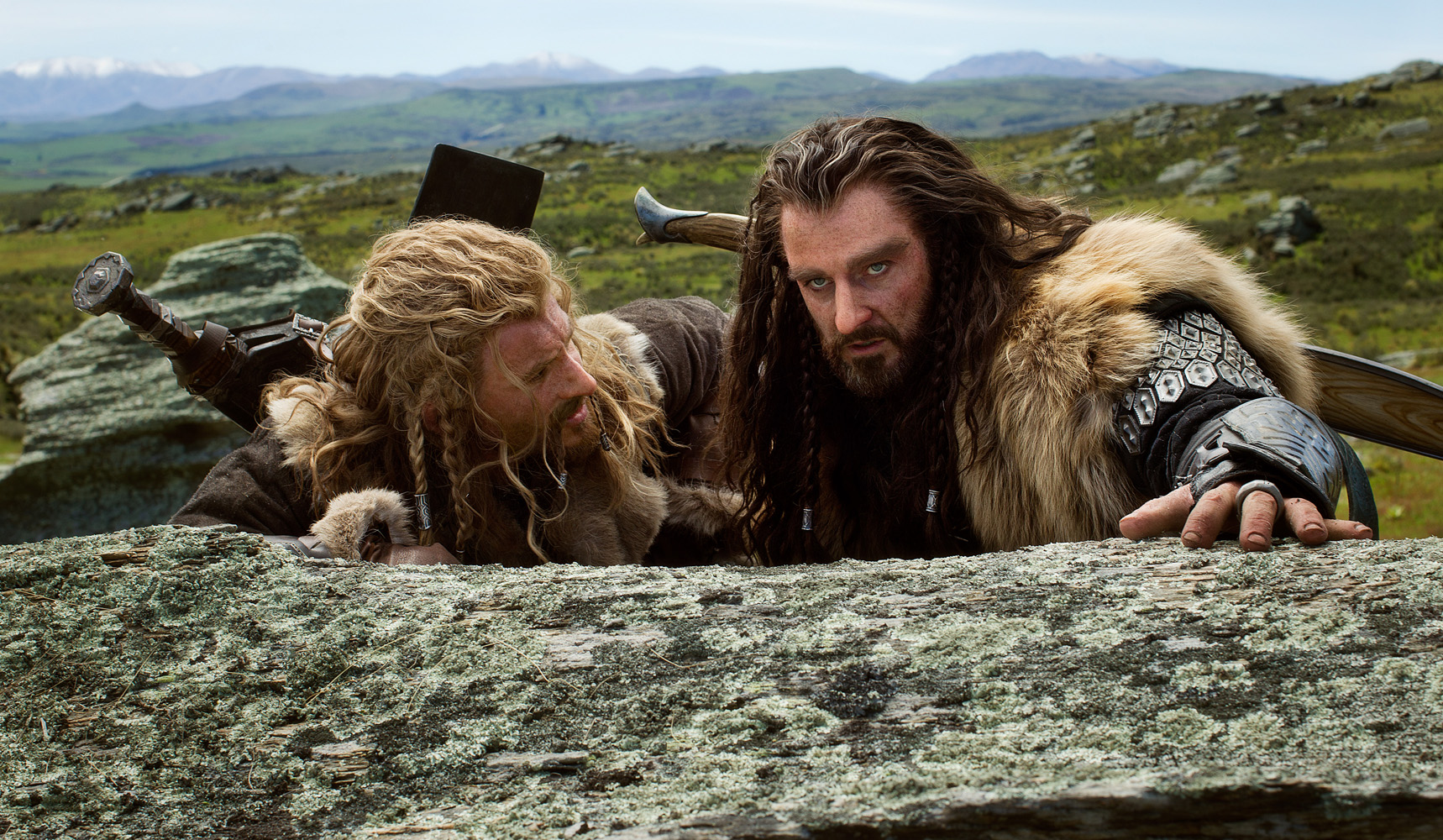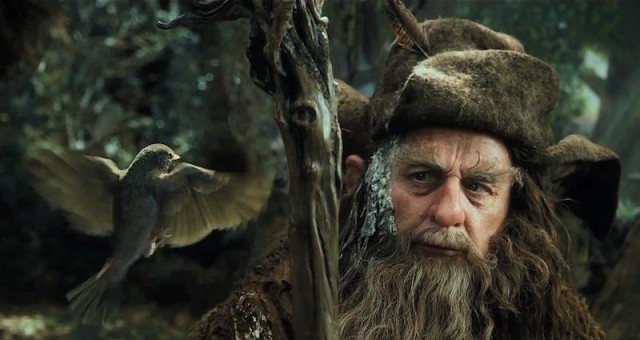IN DEPTH: How the Hobbit Films' Split Personality Changes the Series' Legacy
The Hobbit: The Battle of the Five Armies is set to hit theatres in less than a month. With its release, Peter Jackson’s epic film series set in J.R.R. Tolkien’s Middle Earth will come to a close. Barring some sort of (wildly improbable) adaptation of The Silmarillion or one of Tolkien’s other, more impenetrable works, we’ll have seen our last film with hobbits and rings and wizards for some time.
Being a responsible reviewer, I’m holding off on making any predictions about the quality of The Battle of the Five Armies until it’s released. But it’s not too early to think about the series as a whole, especially when we include the three films that started it all ten years ago, the Lord of the Rings trilogy. Together, the six movies will be a remarkable feat of craftsmanship, and the Rings chapters in particular can claim a lot of critical praise alongside their financial success and fan appreciation.
What should we make of the Hobbit movies, though? I’d be lying if I said they’ve been as universally beloved as the Rings movies, and I don’t think it’s entirely because we’re all a bit older and more jaded than we were ten years ago.
Instead, I think the main issue with the Hobbit films is a case of split-personality disorder. Because it’s been made after The Lord of the Rings, there’s an odd sense that the Hobbit trilogy is trying to be two things at once: a sweeping, grand story of battles and quests, as well as a charming solo adventure, in the style of a children’s bedtime story. That dichotomy may also exist in the source text, but it’s very noticeable on the big screen, where we don’t have a grandfatherly narrator to bridge the gaps between funny dwarves and charred battlefields.
You only have to look at the first two films in the trilogy for proof. Both An Unexpected Journey and The Desolation of Smaug have an odd blend of slapstick humour (a wizard in a rabbit sleigh, food fights, dwarves in toilets) and dramatic action (some have pointed out that the Hobbit series has more orc decapitations than any of the Rings films).
In many cases, this mix wouldn’t be bad in and of itself, but in his dramatic scenes, Peter Jackson seems to be “quoting” the Rings films, arranging character relationships and plot events to strongly resemble his earlier work. More than once, I’ve wondered whether the Hobbit films are actually extending the world of The Lord of the Rings, or whether they’re just reshaping it for a new decade.
How did this split personality come about? The answer’s actually kind of complicated, since the original novel’s tone, director Peter Jackson’s filmmaking style, and the business aspect of Hollywood all play a role.
First, take a look at the novel. It’s important to note that accuracy to Tolkien’s story wouldn’t necessarily “fix” issues with the movie – and the topic of accuracy in film adaptations is another whole post.
That being said, one of the things the novel has going for it is the aforementioned narrator, who acts like a gatekeeper to the world of the story. The funnier, kid-friendly parts of Bilbo’s adventure appear to blend more seamlessly with the action-heavy elements of the story when it’s being relayed by a third party. Meanwhile, the lighter, bouncier parts in the films can feel distracting and off-kilter, especially for viewers used to the vibe of The Lord of the Rings.
I wonder whether it’s something Peter Jackson directly struggled with in production. At this stage in his filmmaking career, he’s established himself as a maker of epic films, like Rings and his remake of King Kong (which I quite liked, incidentally). He also has a reputation for releasing uber-long extended editions of his work. All this to say that Jackson is not the sort of director used to making trim, condensed stories, when that may have been exactly what The Hobbit needed.
As more than one fan has pointed out, The Hobbit is a short novel. My own instinct would be to turn it into one 3-hour film or two 2-hour films. By spinning it into three 3-hour films, Jackson has caved to the temptation of making another epic trilogy, giving himself plenty of runtime to fill with extra gags and longer battles. With all this extra space, and less plot from the book to fill it, some of the weaker material (like having Radagast’s hair caked with bird droppings) still makes into the final cut.
Sure, there’s an argument to be made that by extending The Hobbit into these three films, it allows Jackson to explore storylines from Tolkien’s supplementary writing that don’t directly appear in the original novel. I suspect, though, that there’s a reason Tolkien left that backstory in his appendices: he probably found it distracted from the main story, and was better left for the truly committed readers to sift through later on.
Source texts and runtimes aside, there’s an even more insidious force at work behind the split personality of the Hobbit movies, and that's the studios funding the production. As much as we’d like to believe that Jackson’s decision to split the story into three installments was made to serve the story, it’s more likely that Warner Bros. and MGM were encouraging Jackson to “expand his vision”, so they could get a bigger slice of box office revenue.
Let’s not forget the trials and tribulations of the production. There were funding problems, labour disputes, and the unfortunate departure of Guillermo del Toro as the director partway through development. In that climate, it’s not uncommon for studio bosses to begin offering their input on the creative process. I wouldn’t be surprised if they offered comments like, “Can you make it more Lord-of-the-Rings-ish?”, or “How about a forbidden love story? Hmm…no scruffy human to match with an elf, you say? How about a scruffy dwarf and an elf?”
Financially, it would make sense for the studio to push Jackson away from the original storybook tone of the novel. After all, between 2001 and 2004, New Line Cinema raked in billions of dollars in box office receipts from an epic trilogy with a huge cast that featured big battles and multiple love stories. To an extent, there’s a broad appeal in that combination that might bring in people who wouldn’t normally see a fantasy film. So it’s only reasonable to expect the studios to want to same thing again, and when it comes to The Hobbit, that would mean making lots of changes.
Of course, until someone from Jackson’s team talks about studio influence specifically, we won’t know for sure. It’s just that the callbacks to the Rings films are so strong in The Hobbit trilogy, and Jackson’s work isn’t usually so reliant on his past films (at least, not to the point of reusing whole scenes).
So where will The Battle of the Five Armies leave us? Without a doubt, the movie (including what’s being reported as a 45-minute battle scene) will probably more strongly resemble The Two Towers or The Return of the King than anything else. It’s not necessarily a bad thing, but it’s also not really in line with that down-to-earth scene that opens the second act of An Unexpected Journey, with Bilbo running off from a colourful Shire, exclaiming he’s “going on an adventure!”.
I have a feeling that the legacy of the Hobbit films will be as Rings prequels first, and Hobbit adaptations second. Unfortunately, in an ideal world, the series would be more clearly one or the other, and not a shifting, inconsistent entity. We would either have a mature film trilogy with a large, well-developed cast, or a family-friendly adventure tale about a single character.
The good news is that if you can put these criticisms aside and lose yourself in Middle Earth at all, then Peter Jackson and co. have succeeded. In a way, we should be grateful that The Hobbit was adapted with this level of care and attention to detail, when many studios and filmmakers could have botched the whole thing. Imagine a Hobbit film directed by Michael Bay, for example. Terrifying, I know!
However the final Hobbit film turns out, I will be there for subsequent screenings, and I’ll probably end up owning the ultimate, extended edition Blu-ray. As a series, the Hobbit/Lord of the Rings movies are examples of a kind of epic filmmaking that’s surprisingly difficult to find nowadays. If you strip away the fantasy elements, the DNA of filmmakers like David Lean, Cecil B. DeMille and Francis Ford Coppola lives on in Jackson’s Middle Earth series, and that’s worth celebrating – rabbit sleighs and dwarf/elf romances be damned.
-
What do you think the legacy of the Hobbit films will be? Have you also picked up on the split personality of the movies? Join the discussion in the comments section, and if you liked this article, share it with your friends and followers!


